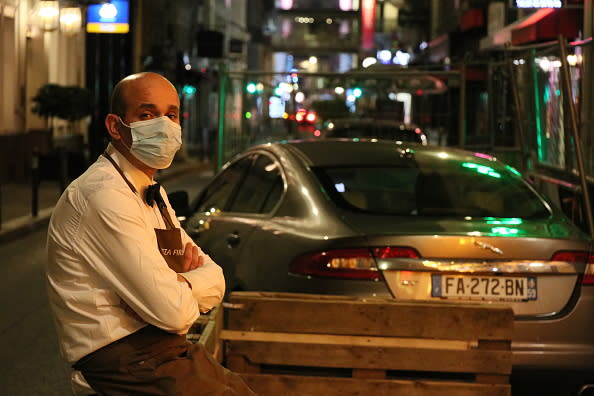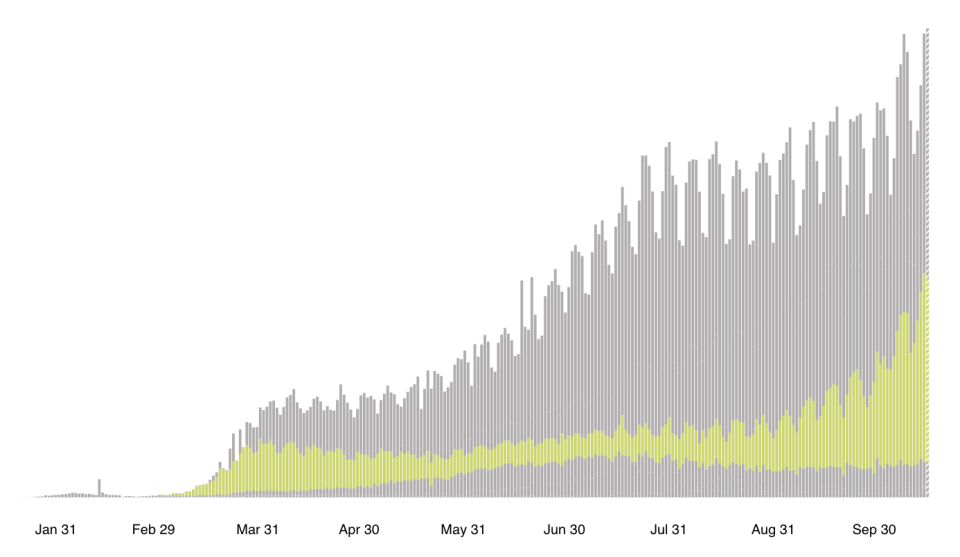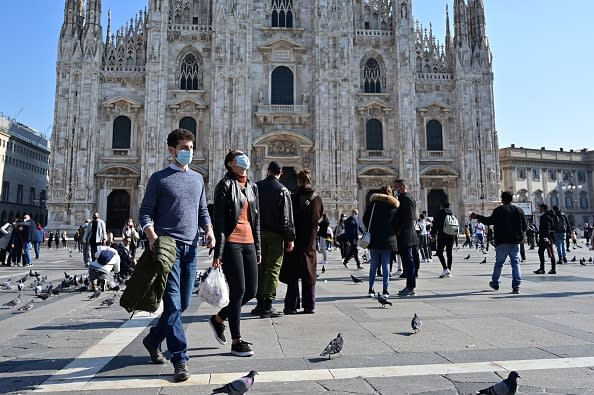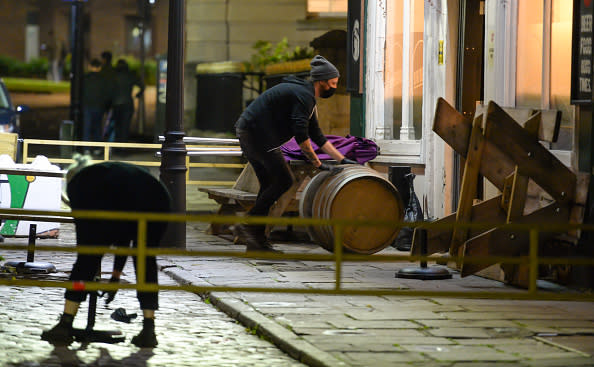'On the brink of disaster': Continent's Covid fight takes a dark turn
Europe has exceeded 150,000 new coronavirus cases in a single day with countries including France, Italy and Germany reporting record daily numbers of infections this week.
The grim milestone comes just a week after Europe was experiencing 100,000 daily cases, highlighting the accelerating nature of the continent’s second wave.
Much of Europe has tightened curbs including measures such as shutting or ordering early closing of bars, but now the surging infection rates are also testing governments’ resolve to keep schools and non-Covid medical care going.
Globally, cases rose by more than 400,000 for the first time late on Saturday, a record one-day increase.

In Poland, which currently has more than 3,500 deaths and 167,000 cases immunologist Pawel Grzesiowski told The Guardian, “we are on the brink of disaster”.
Countries like the Netherlands and Belgium have also seen virus cases shoot up dramatically in recent weeks.
As a region, Europe is reporting more daily cases than India, Brazil and the United States combined. The increase is partly explained by far more testing than was done in the first wave of the pandemic.
The United Kingdom, France, Russia, Netherlands, Germany and Spain accounted for about half of Europe’s new cases this week, according to a Reuters tally.
France, which is reporting the highest seven-day average of new cases in Europe with 21,210 infections per day, reported a record 30,621 cases on Thursday, according to the tally.
In the past seven days it has registered nearly 142,800 new infections, more than the 132,430 registered during the entire two-month lockdown from mid-March to mid-May.
French President Emmanuel Macron ordered a third of France’s population be put under nightly curfew on Wednesday (local time), with the measure taking effect from Saturday.

The United Kingdom is reporting a seven-day average of 16,228 new cases per day, and has introduced a tiered system of tougher restrictions in some areas.
Germany has reported new daily records three times this week, reporting more than 7,000 daily cases for the first time on Thursday. It reported a record 7,830 new cases on Saturday, according to the Robert Koch Institute (RKI) for infectious diseases.
By European standards, Germany has experienced relatively low infection and death rates so far during the pandemic, but Chancellor Angela Merkel has warned there could be 19,200 infections per day if current trends continue.
Europe currently has recorded over 17 per cent of total global coronavirus cases and nearly 22 per cent of deaths worldwide.
The five countries reporting the most deaths in Europe are the United Kingdom (43,429), Italy (36,427), Spain (33,775), France (33,134) and Russia (23,723), according to a Reuters tally.

British police granted new powers
In the UK, British police have been granted access to details of people who have been told to self-isolate under the government's 'test and trace' system, the Department of Health and Social Care (DHSC) said.
A spokesman for the department said it agreed with the National Police Chiefs Council (NPCC) that officers could have access on a case-by-case basis to information on whether a specific individual has been notified to self-isolate.
The test and trace system, which Prime Minister Boris Johnson promised would be world beating, has seen setbacks including a glitch identified earlier this month that delayed the upload of nearly 16,000 cases into computer systems, including for contact tracers.
Italy to announce new restrictions
Italian Prime Minister Giuseppe Conte will announce on Sunday (local time) another set of measures to counter the new wave of COVID-19 cases, his office said, after the country registered a new daily record in infections on Saturday.
Mr Conte's office said the government is discussing new restrictions with local and health authorities, aiming to stem contagion while limiting the impact on individuals and businesses.

Italy was the first major European country to be hit by Covid-19 and had managed to get the outbreak under control by the summer thanks to a rigid two-month lockdown on business and people's movement. But infections have soared in recent weeks.
The country posted 10,925 new infections on Saturday, according to the health ministry, its highest daily tally so far, up from the previous record of 10,010 cases posted on Friday.
Government ministers have ruled out a repeat of the lockdown imposed at the start of the crisis but officials have looked at a range of alternative measures to reduce social contact.
The head of the northwestern region of Liguria, Giovanni Toti, said on Facebook the government would urge schools to alternate between online and in-person lessons and tell companies to increase remote working.
The government has already toughened restrictions twice in 10 days, making wearing masks mandatory outside the home and imposing limitations on public gatherings, restaurants, sports, and some school activities.
According to Italian newspapers, the new restrictions could also target non-essential activities including gyms, pools and amateur sporting events.

Paris streets barren as curfew kicks in
The streets and terraces of Paris and eight cities in France emptied on Saturday night as people were asked to stay home to stem a second wave of the coronavirus that caused a record daily number of infections in the country.
Curfew from 9pm until 6am will last at least four weeks.
French President Emmanuel Macron last week ordered nightly curfews in cities where the coronavirus was the most active, saying it was spreading at parties and private gatherings and action was needed or else hospitals risked being overwhelmed.
While some people understood the need to contain the virus, restaurant managers cautioned about the impact on a sector that already suffered major losses during the spring lockdown.
Stafano Anselmo, manager of Paris-based Italian restaurant Bianco, said “it’s a disaster”.
“There will surely be employees who will lose their jobs, several restaurants will go bankrupt,” he said.
France, like other European countries, is grappling with how to slow the virus’ spread and ease pressure on a once-again strained healthcare system while keeping its A$3.8 trillion economy open and protecting jobs.
United States on the cusp of third wave
The total number of COVID-19 cases in the US exceeded 8.1 million on Saturday, according to the Center for Systems Science and Engineering (CSSE) at Johns Hopkins University.
The country's cumulative case count reached more than 8.1million, including a death toll of more than 219,000 on Saturday, according to the CSSE.
The United States remains the worst-hit country in the world, with the highest caseload and death toll.

According to a report by CNN, 10 states recorded their highest single-day tallies of new Covid-19 infections Friday (local time), and the country reported its highest one-day total since July, as experts say a dangerous surge of coronavirus infections is well underway as the country heads towards winter.
Dr Megan Ranney, from Brown University, tweeted on Thursday people need to “wear a mask and get ready to hunker down again”.
“I'm not a doomsday person: but this is the beginning of the wave. The infections that will fill our hospital in two weeks, have already been transmitted,” she tweeted.
The US reported more than 69,100 new Covid-19 infections Friday – the most in a single day since about 71,300 were reported July 29, according to Johns Hopkins University data.
Ten states Friday reported their highest one-day case counts: Colorado, Idaho, Indiana, Minnesota, New Mexico, North Carolina, North Dakota, West Virginia, Wisconsin and Wyoming.
In Minnesota, public health officials said Saturday they've so far traced at least 20 cases of the virus back to a rally held by President Donald Trump last month, or to related events.
Of the 20 cases, 16 are among people who attended the rally and four people participated in counter-protests the same day.
with Reuters
Do you have a story tip? Email: newsroomau@yahoonews.com.
You can also follow us on Facebook, Instagram and Twitter and download the Yahoo News app from the App Store or Google Play.



